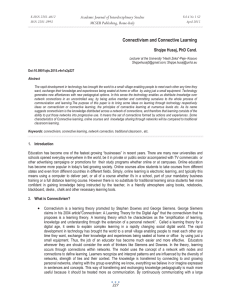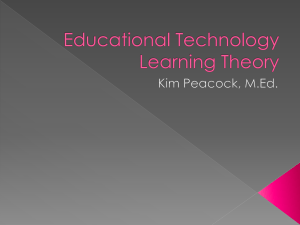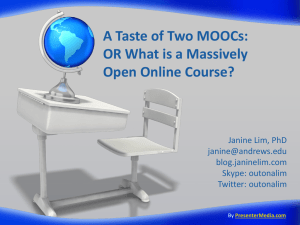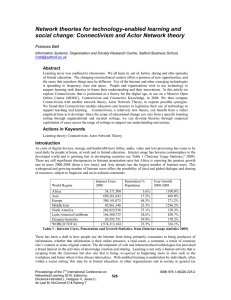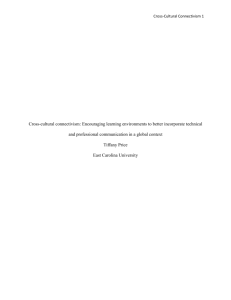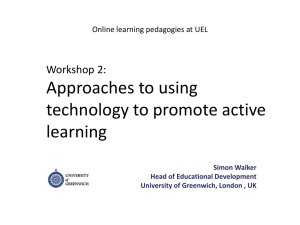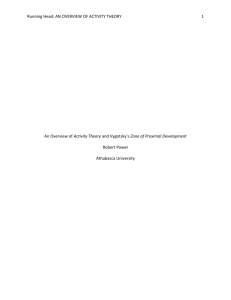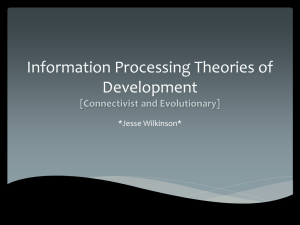Connectivism as a knowledge network
advertisement
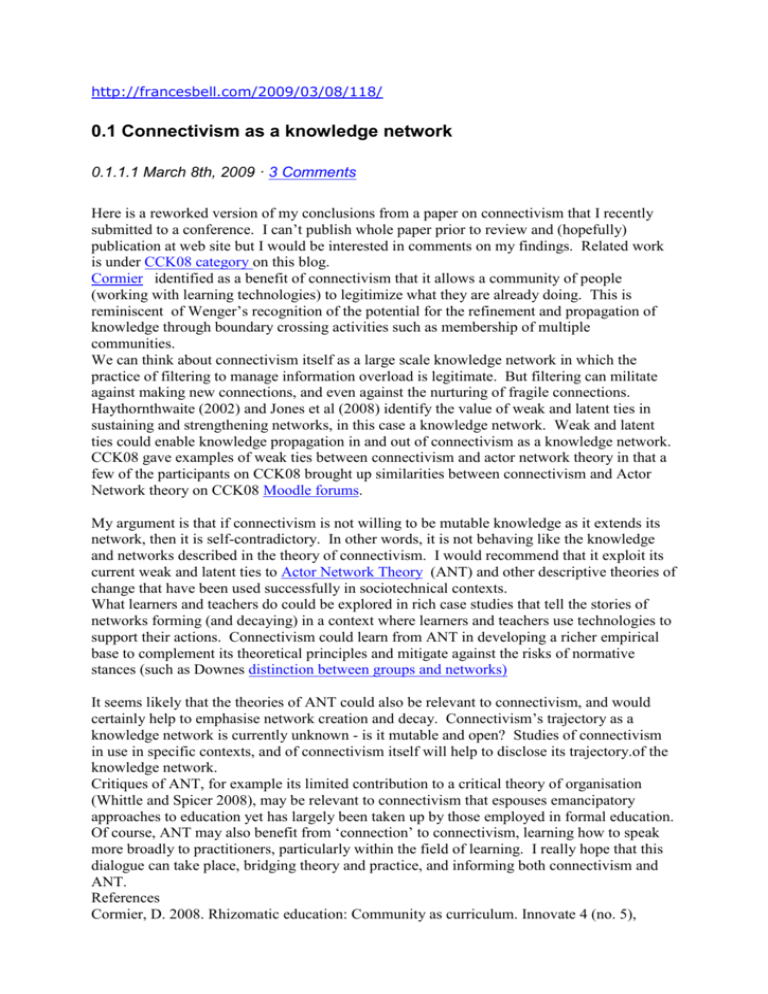
http://francesbell.com/2009/03/08/118/ 0.1 Connectivism as a knowledge network 0.1.1.1 March 8th, 2009 · 3 Comments Here is a reworked version of my conclusions from a paper on connectivism that I recently submitted to a conference. I can’t publish whole paper prior to review and (hopefully) publication at web site but I would be interested in comments on my findings. Related work is under CCK08 category on this blog. Cormier identified as a benefit of connectivism that it allows a community of people (working with learning technologies) to legitimize what they are already doing. This is reminiscent of Wenger’s recognition of the potential for the refinement and propagation of knowledge through boundary crossing activities such as membership of multiple communities. We can think about connectivism itself as a large scale knowledge network in which the practice of filtering to manage information overload is legitimate. But filtering can militate against making new connections, and even against the nurturing of fragile connections. Haythornthwaite (2002) and Jones et al (2008) identify the value of weak and latent ties in sustaining and strengthening networks, in this case a knowledge network. Weak and latent ties could enable knowledge propagation in and out of connectivism as a knowledge network. CCK08 gave examples of weak ties between connectivism and actor network theory in that a few of the participants on CCK08 brought up similarities between connectivism and Actor Network theory on CCK08 Moodle forums. My argument is that if connectivism is not willing to be mutable knowledge as it extends its network, then it is self-contradictory. In other words, it is not behaving like the knowledge and networks described in the theory of connectivism. I would recommend that it exploit its current weak and latent ties to Actor Network Theory (ANT) and other descriptive theories of change that have been used successfully in sociotechnical contexts. What learners and teachers do could be explored in rich case studies that tell the stories of networks forming (and decaying) in a context where learners and teachers use technologies to support their actions. Connectivism could learn from ANT in developing a richer empirical base to complement its theoretical principles and mitigate against the risks of normative stances (such as Downes distinction between groups and networks) It seems likely that the theories of ANT could also be relevant to connectivism, and would certainly help to emphasise network creation and decay. Connectivism’s trajectory as a knowledge network is currently unknown - is it mutable and open? Studies of connectivism in use in specific contexts, and of connectivism itself will help to disclose its trajectory.of the knowledge network. Critiques of ANT, for example its limited contribution to a critical theory of organisation (Whittle and Spicer 2008), may be relevant to connectivism that espouses emancipatory approaches to education yet has largely been taken up by those employed in formal education. Of course, ANT may also benefit from ‘connection’ to connectivism, learning how to speak more broadly to practitioners, particularly within the field of learning. I really hope that this dialogue can take place, bridging theory and practice, and informing both connectivism and ANT. References Cormier, D. 2008. Rhizomatic education: Community as curriculum. Innovate 4 (no. 5), http://tinyurl.com/6axkez (accessed 12 Feb 2009). Haythornthwaite, C. 2002. Strong, weak, and latent ties and the impact of new media. Information Society 18: 385-401. Jones, C.R., D. Ferreday and V. Hodgson. 2008. Networked learning a relational approach: Weak and strong ties. Journal of Computer Assisted Learning 24: 90-102. Latour, B. On recalling ant. Department of Sociology, Lancaster University.http://www.comp.lancs.ac.uk/sociology/papers/Latour-Recalling-ANT.pdf Law, J. Actor network theory and material semiotics. http://www.heterogeneities.net/publications/Law-ANTandMaterialSemiotics.pdf Siemens, G. 2004. Connectivism: A learning theory for the digital age. http://www.elearnspace.org/Articles/connectivism.htm (accessed 7 September 2008). Wenger, E. 2000. Communities of practice and social learning systems. Organization Science 7 (no. 2), http://books.google.co.uk/books?hl=en&lr=&id=-6i9NcUbJ8C&oi=fnd&pg=PA76&dq=%22Wenger%22+%22Communities+of+practice+and+s ocial+learning+systems%22+&ots=t3U5JCoI_-&sig=r5_DbeT0hw7Dtzm1labSGhgFNAw (accessed. Whittle, A. and A. Spicer. 2008. Is actor network theory critique? Organization Studies 29: 611-29. Share and Enjoy: Tags: CCK08 0.1.2 3 responses so far ↓ 1 Ben Light // Mar 13, 2009 at 6:15 pm I’m don’t really know too much about connectivism, but I like the idea you put forward of connectivism being applied to itself. I also think referring to critiques of other theories that might share common ground is also helpful - even if the result is, for whatever reason, they don’t apply. Ben. 2 CONNECTIVISM AS A KNOWLEDGE NETWORK: Online Education Resources // Mar 15, 2009 at 6:10 pm [...] Blog, March 13, 2009 [Tags: Traditional and Online Courses, Connectivism, Networks, Wikipedia] [Link] [...] 3 » OLDaily per Stephen Downes, 13 de març de 2009 TIC, E/A, FER / PER…: // Apr 2, 2009 at 1:46 pm [...] amb els materials i ofereix les seues reflexions. Frances Bell’s Blog (blog de Frances Bell) [L'enllaç] [Etiquetes: cursos tradicionals i en línia, Conectivisme, xarxes, [...]
